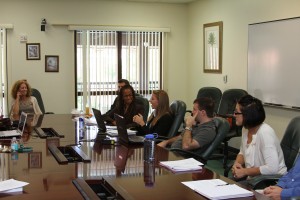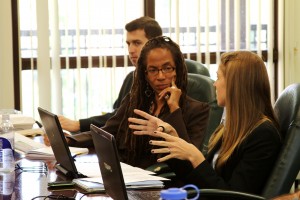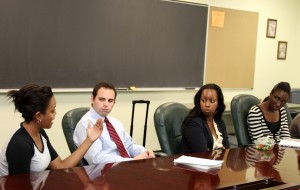Students, professor work to find justice for juveniles
Story by Valeria Obi
Professor Judith Scully is working on a pro bono initiative at Stetson that is inspiring law students to reach out to educate juveniles and the community about the harsh consequences of the criminal punishment system.
Last year, the U.S. Supreme Court ruled that it was unconstitutional to sentence juveniles who have not committed murder to life in prison without the possibility of parole. Juveniles resentenced in Florida courts following the Supreme Court decision still face lengthy sentences. For many kids, being caught up in the adult justice system can mature into a life of crime, with repeat offenses and arrests.
A Nov. 21, 2010, article by Lloyd Dunkelberger in the Ocala Star-Banner reported that there were more than 100 people sentenced to life in prison without chance of parole for non-murder crimes that they committed as juveniles. “Florida has sentenced far more juveniles to such sentences than all other states combined,” Dunkelberger wrote.
“Intervention and education at an earlier age can help shut down the school-to-prison pipeline,” said Professor Scully, an expert in criminal law who also leads the Innocence Initiative at Stetson.
Approximately 40 law students showed up at the first meeting of the Juvenile Justice Initiative at Stetson in Gulfport a few weeks ago. There are already two students enrolled in externships working with juvenile cases this semester.
Student Robson Powers, one of the members of the Juvenile Justice Initiative student organization, is working in an externship at a criminal defense firm. Powers said that he joined the Juvenile Justice Initiative at Stetson because he believes that juveniles should be treated as juveniles and not be tried in adult courts.
“The misguided notion of ‘adult time, adult crime’ goes against the fabric of juvenile court,” said Powers. “Juveniles are different and deserve rehabilitation, not incarceration.”
Powers took several classes on criminal and juvenile law and wrote a seminar research paper on the disproportionate number of minority juveniles who get transferred to adult court in Florida. Before law school, Powers helped prepare federal prosecutions at the U.S. Attorney’s Office for the Middle District of Florida in the criminal division.
Besides providing externships for students in the juvenile criminal law field, Stetson’s Juvenile Justice Initiative will bring a speaker series to campus and introduce a Street Law Program into Pinellas County middle schools in the spring.
Student Amy Ray is developing the proposal and curriculum for the Street Law Program, designed for at-risk middle school students.
By giving juveniles the necessary information to make informed decisions, providing them with tools and alternatives to crime, and illustrating the consequences of illegal behavior, Ray said that she hopes that Street Law can intervene at a critical point to help break the school-to-prison cycle.
Ray is finishing both her master’s degree in public health and law degree. She already has a master’s in criminal justice focusing on the theoretical aspects of delinquency, and she has studied violence as a public health concern.
“If this initiative can be implemented effectively in the community, then it has the power to grow outside of the county,” Ray said. “I’d like to see it partner with the Florida Department of Health as a way to grow.”
Annaliese Bullock, a founding member of the Juvenile Justice Initiative, said that she has always had a desire to work with youth, even before coming to law school. Bullock is researching diversion programs and crossover youth. Diversion programs offer youth an alternative to prison time, and steer them in the direction of counseling, community service, or similar alternatives that will improve their situation. Crossover youth are those who are involved in both the juvenile dependency and delinquency system.

Students in the Juvenile Justice Initiative at Stetson met to discuss programs to serve the needs of juveniles caught up in the criminal punishment system.
“I’d like to see the Juvenile Justice Initiative Street Law Program help educate local youth about the law, their rights and overall human rights,” Bullock said. “I’d also like to see the program grow to educate Stetson students about youth issues and to encourage community relationships.”
Professor Scully said that she hopes that this initiative will inspire students and others to see juvenile law as an important area of law and not just as a stepping stone to other careers.
Student Jessica Becht plans to pursue a career in juvenile law after graduating and is a researcher for the Juvenile Justice Initiative Street Law Program. An internship in college with a Circuit Court Family judge working in dependency and delinquency court sparked her interest. She said that she hopes that the Juvenile Justice Initiative will help show law students the importance of being advocates for young people and how to be more responsive to the diversity of issues raised by juvenile criminal law.
Judge Irene Sullivan, former circuit court judge in the Unified Family Court, is teaching a Juvenile Law Seminar this semester at Stetson. The class she co-taught with Professors Judith Scully and Robert Batey at Stetson on juvenile law last semester inspired the Juvenile Justice Initiative.
“Clients in juvenile defense are often underprivileged, low-income kids, some struggling with learning disabilities and poverty,” Professor Scully said.
Becht said that education is the first step toward fixing the problem of juvenile crime in the area.
“Community advocacy and community education are part of the broader definition of advocacy and we, at Stetson, specialize in teaching advocacy,” Professor Scully said.
Post date: Nov. 2, 2011
Media contact: Kate Bradshaw
[email protected] | 727-430-1580

